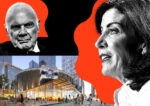Madison Square Garden has had four homes in the past 144 years. Transit advocates, some Manhattan elected officials and even a few developers want to make it five.
The issue is now coming to a head: The City Council is scheduled to vote Monday on whether and for how long to extend the arena’s permit to operate above Penn Station.
The City Planning Commission, controlled by Mayor Eric Adams, has suggested 10 years. Several local politicians have called for a maximum of three. The one request certain to be rejected is from the arena’s owner, the Dolan family, which wants a permanent permit.
If the Council grants a brief extension, the Dolans would likely need to make a deal with the Metropolitan Transportation Authority to accommodate plans to overhaul Penn Station, or — less likely but still possible — to relocate the arena. At least, that is the hope of lawmakers.
“A three-year permit gives them an opportunity to do a deal for what is needed by the MTA and Amtrak for a new, improved Penn Station,” said Sen. Liz Krueger. “If we give them a longer permit, there is no pressure.”
Krueger, Sen. Brad Hoylman-Sigal and Assembly member Tony Simone wrote in the New York Daily News that relocating the Garden would be ideal, but absent that, the City Council should only renew the permit for three years.
Moving the arena would create development opportunities — not just to build a new Garden but to put something else on its current footprint, this time without smothering Penn Station.
State officials have argued that relocating MSG would be prohibitively expensive, although critics believe they are overstating the cost. The Hochul administration is pushing a redesign that requires the arena to instead “collaborate on property swaps,” including its interest in a defunct taxiway on Eighth Avenue.
MSG has balked at the idea of turning over parts of the property free of charge, frustrating transit officials. Last week Jamie Torres Springer, the MTA’s president of construction, indicated that the agency would use eminent domain “if necessary.”
Meanwhile, Amtrak executive Andy Byford, speaking as an individual and not on the railroad’s behalf, has publicly promoted the idea of moving the arena. Amtrak — the owner and a major user of the station — has criticized the MTA for making “unilateral decisions” about the transit hub, Gothamist reported.
In 2013, the City Council renewed MSG’s permit for 10 years, believing it was creating pressure and opportunity for the Garden’s owners and the Cuomo administration to find the arena a new home. That, of course, did not happen.
Nearly two decades ago, the arena’s owners contemplated moving MSG one block west, to the western portion of the Farley Post Office site. At the time, Vornado Realty Trust and Related Companies envisioned two to three towers on the arena’s vacated site, in addition to a skylight to rescue Penn Station from its perpetual darkness.
Calls to rescue Penn from the bowels of MSG, as well to make it a through-running station, have persisted. The state’s plan for a megadevelopment around Penn, now stalled, was in some ways a sweeter deal for Vornado, allowing for the construction of 10 towers without needing the arena’s air rights.
Several alternative locations for Penn have been pitched over the years. Related Companies floated putting the arena above a proposed Hudson Yards casino, but the idea was rejected. MSG executive Joel Fisher caused a stir in February when he acknowledged at a Community Board 5 meeting that moving the arena across Seventh Avenue would “probably satisfy” the need to keep MSG near mass transit.
One can imagine Fisher got an earful from his boss, James Dolan, about that. At a subsequent City Council hearing, Fisher said, “We have no plans to move, and we are not interested in moving. We don’t own the land across from Seventh Avenue.”
Vornado owns much of that land, but has not publicly shown interest in having the Garden there. Still, a new arena and hotel on the old Hotel Penn site could well be a better bet than building an office tower. Vornado has pushed back plans for office development.
Neighboring bars and businesses wrote a letter this week urging the City Council to renew the Garden’s permit in perpetuity, arguing that they rely heavily on the arena operating at full capacity.
But the arena is not especially helpful to owners of neighboring office buildings, who would benefit more from a public amenity and restaurants catering to white-collar workers.
Attorney Ken Fisher, who represents the Grand Penn Community Alliance, said a new arena would ultimately be beneficial to Dolan. A short permit extension, proponents believe, would help bring the arena owner around to that view.
“If you had a ground-up, 21st century arena, it would be way better for him and way better for the city,” Fisher said. “Maybe we’d get a national convention again.”
Read more



